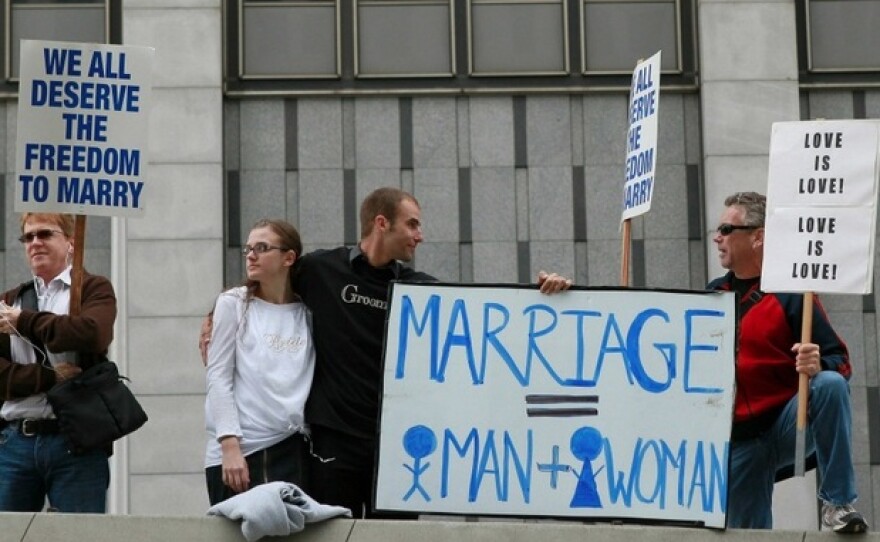SAN FRANCISCO (AP) - A federal judge on Tuesday upheld a gay judge's ruling that struck down California's same-sex marriage ban, saying his fellow jurist was under no obligation to disqualify himself simply because he was in a long-term relationship with another man.
In a 19-page decision responding to the first attempt in the nation to disqualify a judge because of his sexual orientation, Chief U.S. District Judge James Ware said former Chief Judge Vaughn Walker had no obligation to divulge whether he wanted to marry his same-sex partner before he declared last year that voter-approved Proposition 8 was unconstitutional.
"The presumption that Judge Walker, by virtue of being in a same-sex relationship, had a desire to be married that rendered him incapable of making an impartial decision, is as warrantless as the presumption that a female judge is incapable of being impartial in a case in which women seek legal relief," Ware wrote.
The ruling does not settle the legal fight over Proposition 8.
The 9th U.S. Circuit Court of Appeals is considering whether Walker properly concluded that denying gays and lesbians the right to marry violates their rights to due process and equal protection.
The court also is eyeing whether the conservative religious coalition that sponsored the 2008 ballot measure is legally entitled to appeal Walker's verdict.
Ware's opinion on Tuesday came in response to an April motion by coalition lawyers that sought to have Walker's ruling vacated on conflict of interest grounds.
Chad Griffin, president of the American Foundation for Equal Rights, the group that spearheaded the successful effort to overturn Proposition 8 in Walker's court, called Ware's decision to reject the challenge a precedent-setting victory that advances equal rights and treatment for all Americans.
"This bigoted and homophobic motion will prove to be a real low point in the struggle for equality and full civil rights for gay and lesbian people," Griffin said.
ProtectMarriage.com, which filed the challenge, said it would appeal and "continue our tireless efforts to defend the will of the people of California to preserve marriage as the union of a man and a woman."
In his ruling, Ware cited previous cases dealing with women and minority judges in concluding that his predecessor had acted appropriately.
"The sole fact that a federal judge shares the same circumstances or personal characteristics with other members of the general public, and that the judge could be affected by the outcome of a proceeding in the same way that other members of the general public would be affected, is not a basis for either recusal or disqualification," he wrote.
Lawyers for backers of the ban argued at a hearing Monday that Walker should have recused himself or disclosed his relationship because he and his partner stood to personally benefit if Proposition 8 were invalidated and same-sex unions were again legal in California.
Walker publicly revealed after he retired in February that he is in a 10-year relationship with a man. Rumors that he was gay had circulated before and after he presided over the trial in early 2010.
Ware crisply rejected the idea that judges who are members of minority groups have more of a vested interest in the outcome of civil rights cases based on the U.S. Constitution than anyone else.
"We all have an equal stake in a case that challenges the constitutionality of a restriction on a fundamental right," Ware wrote. "The single characteristic that Judge Walker shares with the plaintiffs, albeit one that might not have been shared with the majority of Californians, gave him no greater interest in a proper decision on the merits than would exist for any other judge or citizen."
Many legal scholars had not expected Ware to overturn Walker's decision. They said having a judge's impartiality questioned because he is gay is new territory, but efforts to get female judges thrown off gender discrimination cases or Hispanic judges removed from immigration cases have failed.
Walker did not attend Monday's hearing on the matter and has declined to comment on the bias allegations.
Ware said that Walker did not have a duty to disclose his romantic life and would have hurt "the integrity of the judiciary" if he had revealed his same-sex relationship as part of the Prop. 8 proceedings.
Same-sex couples can legally marry in Connecticut, Iowa, Massachusetts, New Hampshire, Vermont and the District of Columbia.
Gay rights advocates in New York are hoping this week to make their state their sixth to recognize gay, lesbian and bisexual unions. Gov. Andrew Cuomo is pushing to get a gay marriage bill through the New York Legislature, and supporters said on Tuesday they are within one vote of securing its passage.





